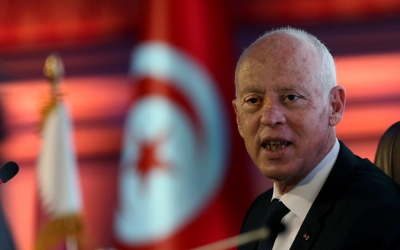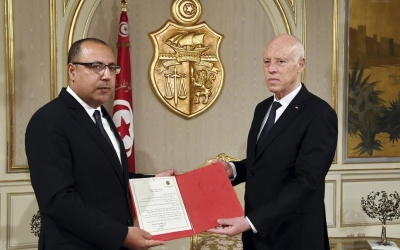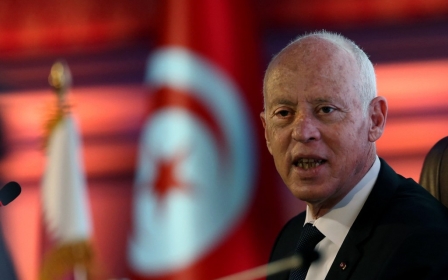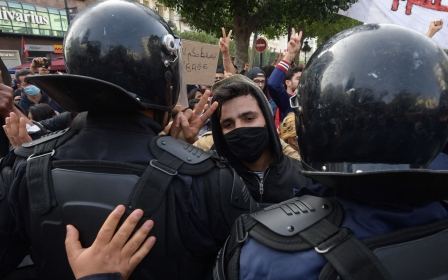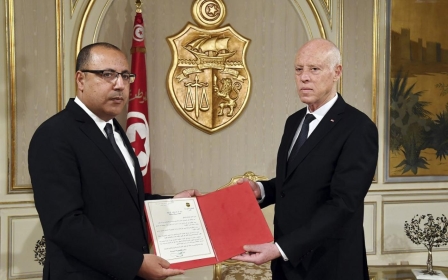Tunisia's Saied accused of 'soft coup' as he makes his latest power play
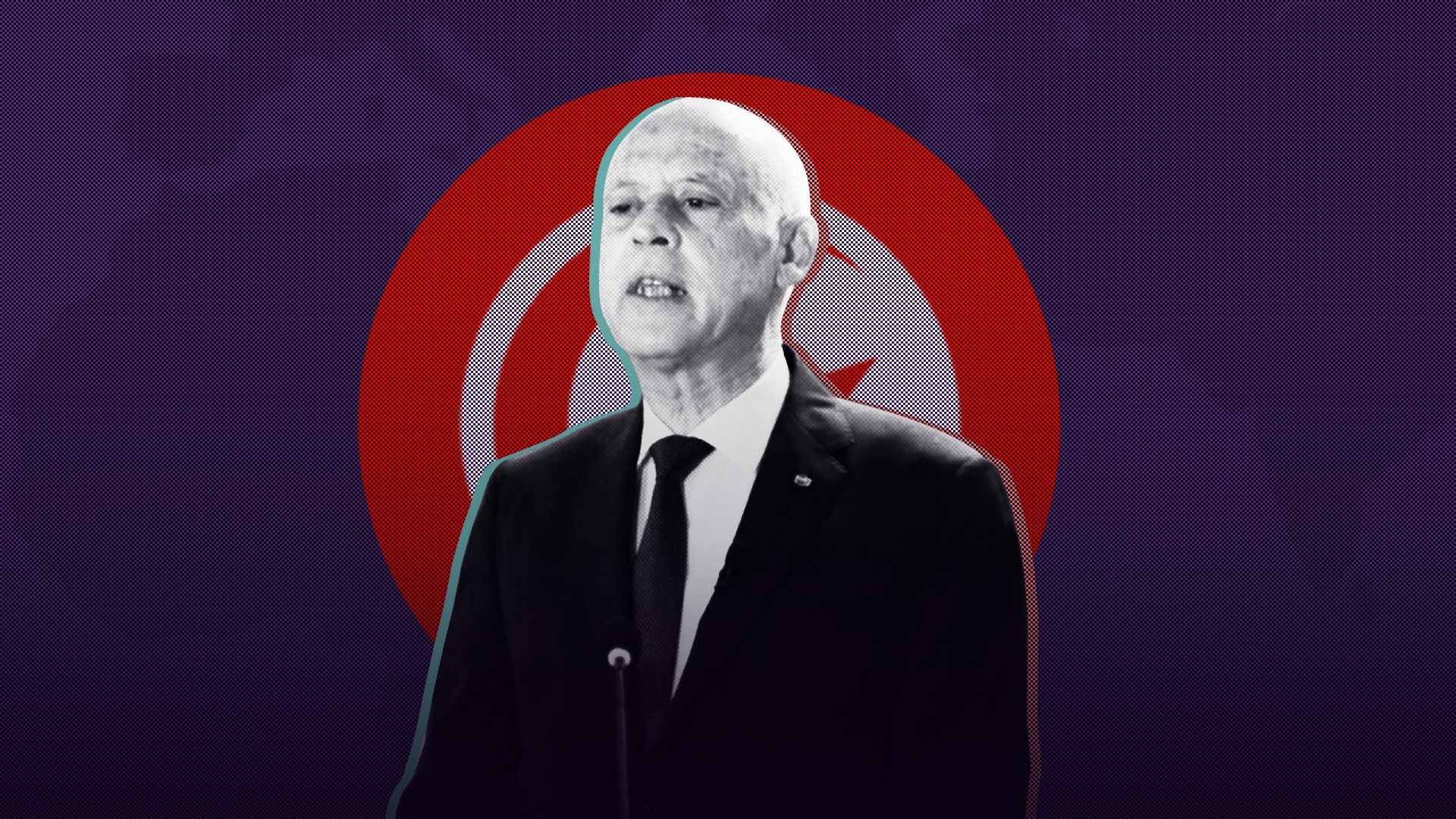
Some Tunisians are asking whether the country is in the midst of a quiet, constitutional coup.
This is in light of a series of increasingly combative moves made by Tunisian President Kais Saied over recent months, causing some observers to warn that Saied could be preparing the ground for further action to eliminate his opponents and strengthen his presidential powers, based on his own interpretation of the country's post-Arab Spring constitution.
Saied cuts an unusual figure in contemporary Tunisian politics. A little-known constitutional law professor who ran as an independent candidate without the backing of an organised or expensive campaign, Kais Saied was elected with over 70 percent of the vote in October 2019.
'The president is the supreme commander of the military and civilian armed forces. Let this matter be clear to all Tunisians'
- President Saied
He is, by definition, a populist, but not in the Donald Trump or Viktor Orban sense: his record is clean, he ran on a platform vowing to fight corruption, and his intentions have thus far appeared benevolent. He also makes efforts to cast himself as an ordinary, unaffected, man of the people.
Prior to boarding his flight to Cairo for a recent meeting with Egyptian President Abdel Fattah el-Sisi, Saied stopped off at a roadside cafe to share a coffee in a paper cup with some locals. In January - as the country was racked by daily demonstrations protesting unemployment rates and economic frustrations worsened by the pandemic - the president turned up unannounced in the middle of the city's main thoroughfare to greet supporters and passers-by.
New MEE newsletter: Jerusalem Dispatch
Sign up to get the latest insights and analysis on Israel-Palestine, alongside Turkey Unpacked and other MEE newsletters
But since the beginning of the year, Tunisia has seen a new side of Saied. In recent months, he has shown himself to be stubborn, partial to at times bizarre, political showmanship, and has shown an unwillingness to negotiate or compromise with his opponents.
Some Tunisians, however, feel this is exactly what the country needs: Saied is indicative of the intense, political polarisation that has solidified in Tunisia over the past year.
At an event celebrating the 65th anniversary of Tunisia's security forces on Sunday, Saied sent a clear, if not threatening, message to Prime Minister Hichem Mechichi, a figure who, though once an ally of Saied, has recently emerged as the president's political nemesis.
"The president is the supreme commander of the military and civilian armed forces. Let this matter be clear to all Tunisians," Saied said in his speech, which was attended by both Mechichi and another of the president's main adversaries, speaker of parliament and Ennahda party leader Rached Ghannouchi.
"There is no distinction. The law, the world's texts and the code of contracts and obligations all mention it. The armed forces are the military and the security forces," said Saied.
Saied's explicit mention of the president's power over the country's internal security forces, rather than solely the army, has put many observers and politicians in Tunisia on high alert.
The Tunisian constitution of 2014 carefully defines a separation of powers within the executive. Currently it gives the president prerogatives over diplomatic and defence issues, while in theory Tunisia's interior ministry and internal security forces are under the control of the prime minister.
This latest polemic may seem a subtle, constitutional technicality to some, but it follows a pattern of increasingly radical rhetoric on the part of the president to claim the upper hand in a political dispute which has paralysed parliament and derailed cohesive governance of the country for months.
'Soft coup'
In January, Saied refused to swear in four ministers chosen by Mechichi in a cabinet reshuffle, saying that the individuals in question had conflicts of interest. And just last week, in a move that alarmed many, Saied blocked parliament's efforts to move forward with the creation of Tunisia's constitutional court, a key component of Tunisia's revolution and its hopes for a resilient democracy that has yet to be established. The court was set to be the first of its kind in the Arab world.
Saied, however, said that the deadline for its creation had passed and that the government had dragged its feet. Some saw this as a sign that Saied felt threatened by Ghannouchi's move - perhaps politically motivated in its timing, as such a court could be the only way to neutralise Saied - and that Saied had resisted the move in order to deprive parliament of more power. Since 2014, however, parliament has made repeated attempts to appoint a constitutional court, and the process has long been beset with problems and disagreements.
On Monday, the leader of Tunisia's Amal Party, Ahmed Nejib Chebbi, accused Saied of carrying out "a soft coup d'etat," while the Economiste Maghrebin wrote that the speech was a sign of Saied's "uncontrollable appetite for power".
Constitutional law professor Rabel al-Kharaifi wrote on Facebook that the move could mean that "painful decisions and difficult days are about to take place, which may begin with a series of arrests among MPs," referencing a comment by Saied in which he said politicians' immunity could not be upheld.
"What is important from this speech is that it has informed all security formations that decisions and instructions are issued by him alone, and he means that and calls on them not to listen to the prime minister," wrote al- Kharaifi.
'It's extreme to say that this is a coup d'etat'
- Youssef Cherif, expert on North African politics at Columbia University
Speaking to Middle East Eye, Radwan Masmoudi, who sits on the political committee for Ennahda - the source of much of Saied's distrust and the target of his outbursts - spoke of his concern that the president's insistence on reinterpreting the constitution could lead to "dangerous actions" that would be tantamount to a coup.
"It would not be a traditional military coup - that's impossible in Tunisia - but what is possible is an end to Tunisia's democratic transition," says Masmoudi. "As the economic and social situation continues to deteriorate, we could reach a very chaotic and ugly situation."
Analysts, however, have emphasised that, so far, it is all just rhetoric, and that even if Saied were to act, he has few resources available to him.
"It's extreme to say that this is a coup d'etat," says Youssef Cherif, an expert on North African politics and director of Columbia Global Centers Tunis, speaking to MEE. "For sure, Saied wants to see a return to a presidential system, but he doesn't have the means or a strong team to apply what he says he wants to do."
Highlighting another occasion last year when Saied spoke in similar rhetoric about the presidential powers over the armed forces, political analyst Tarek Kahlaoui says that those framing Sunday's speech as a "coup" are led by their own political positions, especially those who sympathise with Ennahda.
"The political balance of power in the country wouldn't give him the possibility [of a coup]... this is a war of words and a problem of trust," Kahlaoui says.
What has pushed Saied to his recent behaviour is his distrustful, longstanding conflict with Ghannouchi, Ennahda, and most recently Mechichi. The dispute between the two sides began as early as 2019 and worsened with the failure of Elyes Fakhfakh's government in 2020, which resigned after Ennahda withdrew its support.
"Whatever Kais Saied is doing, it's not coming from a prepared script. It's evolving as the situation changes," Kahlaoui says. "His mistrust of political parties is growing but it was not his position from the beginning."
Part of the issue, Kahlaoui says, is that Saied is not a traditional politician. His comments do not have second or third degrees, and he reacts in outbursts.
"He's not reacting to a victim that is being silent and doing nothing: the other side is doing a lot of secret political manoeuvres, they talk in double discourse. So he's increasingly nervous."
According to Cherif, the conflict between Ghannouchi and Saied is getting out of control, adding that it could ultimately lead to a dissolution of parliament and early elections.
"The president won't be backing down, we know that about his character... With the fallout around the constitutional court, Saied is worried that they are trying to contain him, and he is fighting back with the constitutional tools that he has at his disposal," says Cherif.
Continued popularity
In spite of his complete lack of political experience and the support of a party behind him, it's Saied's popularity amongst the electorate that is keeping him afloat. His continued popularity, analysts say, is because of Saied's unwavering opposition to Ennahda and the political elite.
Recent polls put his approval rating at around 50 percent, streets ahead of other party leaders.
"He offered a clear break with this system. He's a force of contestation. He's not negotiating with different representatives of government and people like this, it's why they voted for him. They really, really hate these other political figures," says Cherif.
'[Saied] has the potential to become a strongman - he's very stubborn, just like a train'
- Radwan Masmoudi, Ennahda
"In other circumstances, he would have lost popularity... he's not changing the system and he's taking the country to a stalemate without offering an alternative."
Many of Saied's supporters believe that the parliamentary system is weak and would like to see the return of the presidential system, saying that a strong, united government is just what Tunisia needs as it faces an unprecedented economic crisis.
Masmoudi, who voted and campaigned for Saied in 2019 but now regrets that decision, warns that Tunisia needs much more time for its democratic transition and that such reforms could risk reverting back to a dictatorship.
"I think if there was a real fight for power, we would see a different Kais Saied," says Masmoudi. "He has the potential to become a strongman - he's very stubborn, just like a train.
"Tunisia cannot be ruled by one man. It's not a one-man show anymore."
Middle East Eye delivers independent and unrivalled coverage and analysis of the Middle East, North Africa and beyond. To learn more about republishing this content and the associated fees, please fill out this form. More about MEE can be found here.


